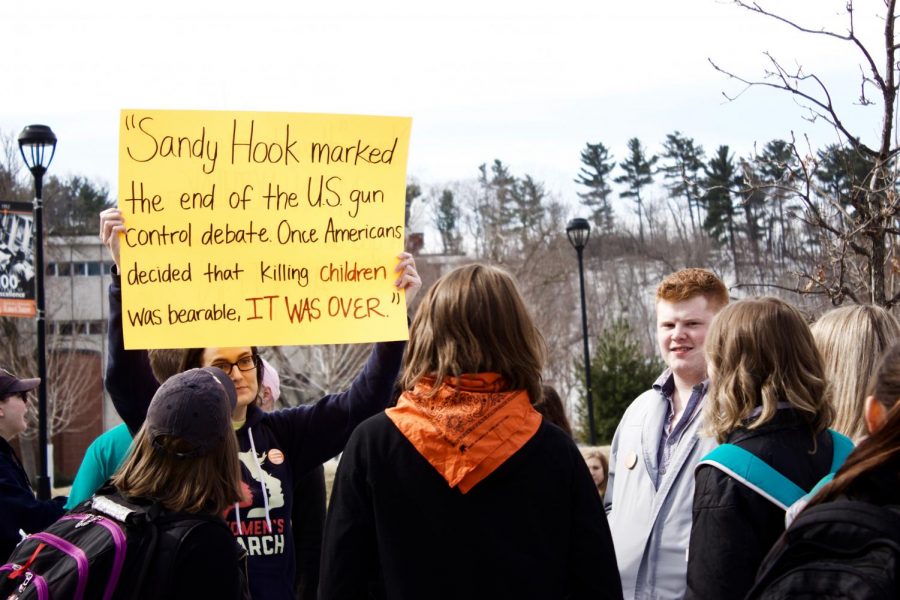Students march around campus to mark Columbine shooting anniversary, protest gun laws
Protesters came together on April 20 in favor of gun control
More stories from Emilee Wentland
Photo by Nicole Bellford
Protesters carried signs and chanted to get their voices heard about gun reform.
Protesters filed into their meeting place at 10 a.m. Friday, baring colorful signs, each crafted to display the crowd’s message: a call for gun reform. While holding the signs, the protesters marched around campus while repeatedly chanting “enough is enough” and “we are students. We are leaders. We are change.”
Nearly 100 people marched for gun reform on April 20 at UW-Eau Claire, marking the 19th anniversary of the Columbine High School shooting where 15 people died, including the two shooters.
The Catalysts, a new student organization at Eau Claire, planned the event for almost two months leading up to the walk out, said Emily Cheasick, a first-year psychology and women’s, gender & sexuality studies student.
They were inspired by the marches following the shooting at Marjory Stoneman Douglas High School in Parkland, Fla. in February, where 17 people died. After messaging each other on Facebook and holding weekly meetings in cafes, The Catalysts formed their organization and planned the walk out, which they promoted on social media.
Before the protesters marched, they observed a moment of silence to honor the victims of not only the Columbine shooting, but all victims of gun violence.
Across the nation at 10 a.m. Friday, students walked out of school to honor the victims of mass shootings, according to CBS News. These groups were mainly made up of high school students, but The Catalysts wanted to get university students involved.
“We saw there were going to be marches all over throughout March and April, so we wanted to contribute to that,” Cheasick said. “We wanted to have upper education sort of represent high schoolers that aren’t getting their voices heard.”
The walk out consisted of students marching around the campus, displaying their signs and yelling chants in favor of gun control, followed by participants sharing stories about how gun violence has affected them. Some had personal stories to share, while others said the abundance of school shootings made them fear for their own safety.
Ashlea Orth, a fifth-year women’s, gender & sexuality studies student, held a sign which read, “Your ‘thoughts and prayers’ mean nothing if you can’t back them up with action.”
Many people in favor of gun control aren’t trying to take away people’s guns, Orth said; instead they are trying to make it harder for people to obtain them. Doing so would require more extensive background checks, she said.
Travis DuChene, a first-year broad field social studies education student and a member of The Catalysts, spoke about how the abundance of school shootings made him feel unsafe.
“I wonder everyday if I’ll walk into a building and not walk out,” DuChene said. “This isn’t happening in some foreign country we can’t relate to; it’s us.”
DuChene plans to be a teacher, so, he said, the problem of school shootings will not end for him once he graduates. Other speakers mentioned their desire to be teachers and their subsequent fear of one day having to protect students from an active shooter.
Protesting isn’t the only way to evoke change, Duchene said.
“Vote, become an activist, talk, educate yourself and challenge your beliefs,” he said. “Doing nothing won’t change anything.”

